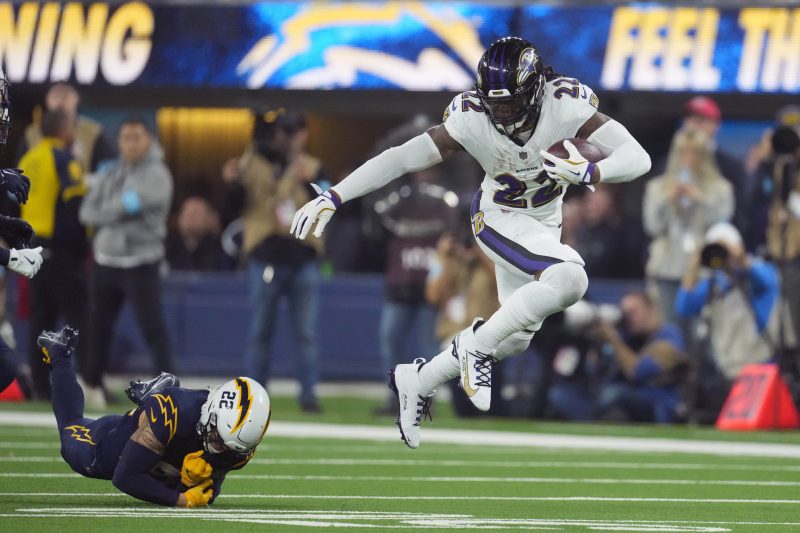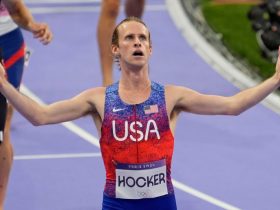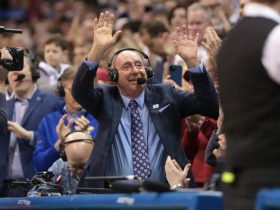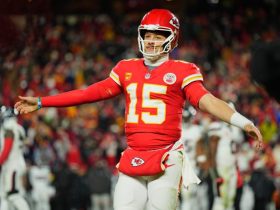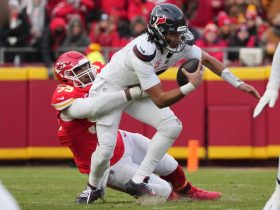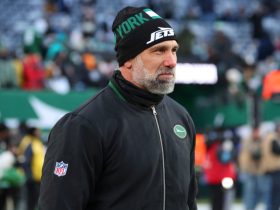Austin Ekeler didn’t say the c-word – collusion – but provided a definition while describing the tribulations NFL running backs have faced on the open market in free agency recently.
“I think it was kind of a strategic play by ownership to say, ‘Hey, let’s suppress some of these guys’ contracts and kind of put some pressure on the relevance of the running back position,’” Ekeler told USA TODAY Sports. “Which clearly is still very relevant today.”
That relevance hasn’t been more apparent all season than after Week 12, especially among elite backs with pedigree who shined for their new teams in the first season of their fresh contracts. Philadelphia Eagles running back Saquon Barkley had two touchdown runs of more than 70 yards on his way to a 303-yard game from scrimmage against the Los Angeles Rams. The Baltimore Ravens’ Derrick Henry rushed for 140 yards in a victory over the Los Angeles Chargers the next night. Josh Jacobs of the Green Bay Packers scored three touchdowns and eclipsed the 100-yard mark against the San Francisco 49ers.
They were the top three players available at the position this past offseason. Any team with cap space (and a need at running back) could have had them. The trio – in order of Barkley, Henry and Jacobs – enter Thanksgiving week the top three rushers in the league, and their new teams are a combined 25-9. The teams that let them walk are 7-26.
Many other variables factor into the winning and the losing, but the organizations that added the backs made existing strengths even more formidable by either putting the ball carriers behind elite offensive lines or alongside other weapons defenses must account for – or both.
NFL STATS CENTRAL: The latest NFL scores, schedules, odds, stats and more.
SAQUON FOR MVP? Not so fast, and here’s why
“I think, in totality, running the football is back, more than it was in the past,” NFL Network analyst and former running back Maurice Jones-Drew told USA TODAY Sports. “I think what Saquon (does) for the Eagles and, I guess, consequently what he didn’t do for the Giants, is why the Giants are going in a different direction at quarterback and the Eagles are thriving.
“Guys like Saquon and Derrick Henry show that you need a top-tier RB to win in this league.”
Prior to entering free agency, all three had received the franchise tag from their former teams at one point or another. Henry, who will be 31 by the end of the regular season, signed the shortest deal with the least guaranteed money (two years, $16 million, with $9 million guaranteed). Barkley and the Eagles agreed to a three-year, $37.75 million deal, with $26 million guaranteed.
“He’s underpaid,” Jones-Drew said.
Jacobs, the youngest of the three at 26, signed a four-year deal worth up to $48 million, with a $12.5 million signing bonus – the only guaranteed money in the contract.
Last summer, as training camp was about to open, a group of running backs – which included Henry, Barkley, Jacobs, Ekeler, the Cleveland Browns’ Nick Chubb and Christian McCaffrey of the San Francisco 49ers – met on Zoom to discuss the subdued market they faced. (McCaffrey ended up getting a contract extension that made him the highest-paid back in the league in terms of average annual salary at $19 million.)
“We’ve all had success – sustained success – so to have, all of a sudden, an anticipation that everyone is going to fall off because they got new contracts is kind of ridiculous. So I think that’s why you saw us band together,” said Ekeler, who signed a two-year deal worth up to $11.43 million with the Washington Commanders after seven seasons with the Chargers (he is also a vocal and respected representative in the players’ union). “Like, ‘Nah, hey, we make a big impact.’ You saw Saquon … you’ve seen Derrick Henry and what he’s done. It’s crazy to me, where you have this perception of, ‘Hm, running backs. Are they valued?’ Well clearly, they are. That’s nice to have.”
Backs also have to fight the “wear-and-tear” narrative the most of any position group. That arguably hurt Henry the most, although he’s looked every bit of his “Tractorcito” Tennessee Titans prime with the Ravens. Jones-Drew said that some front-offices don’t account for the amount of time and money that players at the position put into taking care of their bodies.
“I think that’s part of the conversation as well … so they can perform at a longer clip for a longer time,” he said.
Barkley and Henry will have the chance to go head-to-head Sunday (4:25 p.m. ET, CBS) when their teams clash. Henry said last week that the conversation about running backs and their perceived value didn’t affect his mindset entering the season.
“I trust and believe in my work ethic and knew that would pay off when the season came around,” Henry said. “I just needed an opportunity, and I feel like other guys felt the same way. I know guys want to get their worth, but we’re just focused on our performance.”
Henry hopes the success within his free-agency class of himself, Barkley and Jacobs – throw the Minnesota Vikings’ Aaron Jones (eighth in league in rushing yards) in there, too – can help the position on the open market in the future.
“They’re franchise players. They’re showing that. They’re proving that week after week,” Henry said. “Those guys work hard to let it showcase during the season, and I’m glad that they’re able to showcase their talents and having a great year. And hopefully, they’ll open doors for the future and other running backs that are coming up in free agency to get an opportunity to get paid, as well.”
For more than a decade, modern NFL offenses have placed a greater impetus on passing rather than running the ball; many of the best teams had balance in their offensive attack, of course. But Jones-Drew said the 2024 season has “re-identified” the running back position.
“Guys needed to go to places where they’re loved and not tolerated,” Jones-Drew said.
At the very least, running backs will have each other’s backs – except for days they are playing one another.
“We just tell each other, ‘Great job. You had a great game,’ just hyping each other up,” Henry said. “Backs, we’ve got to stick together, and I’m glad to see everybody doing well.”

